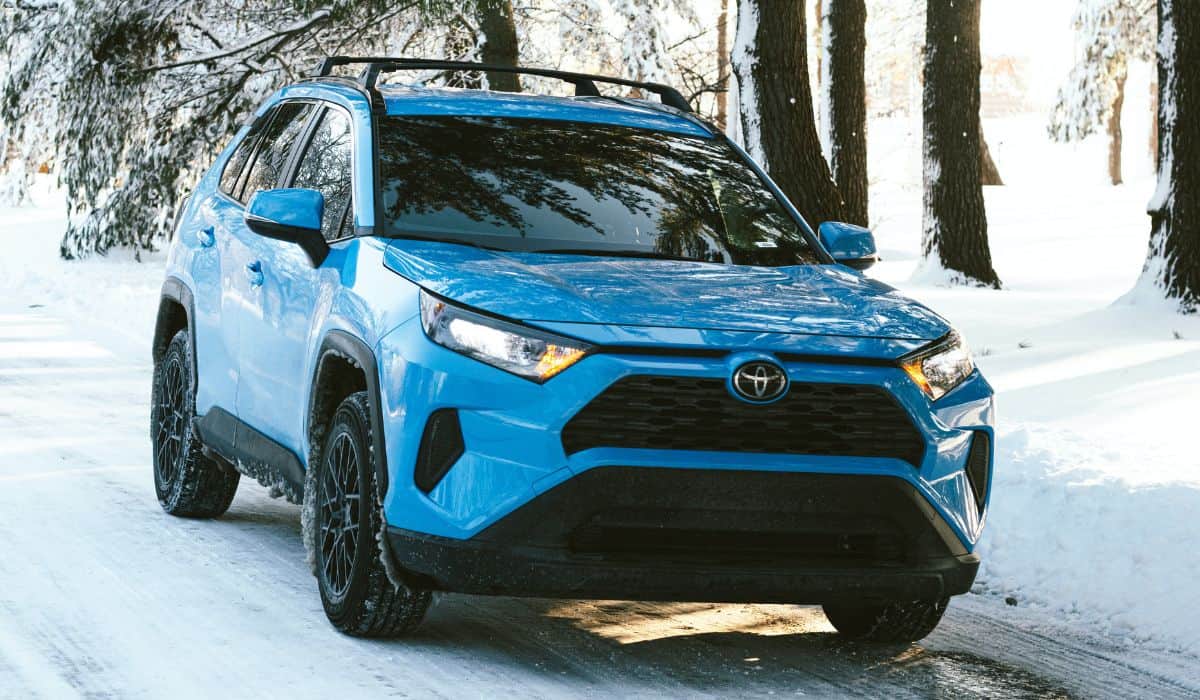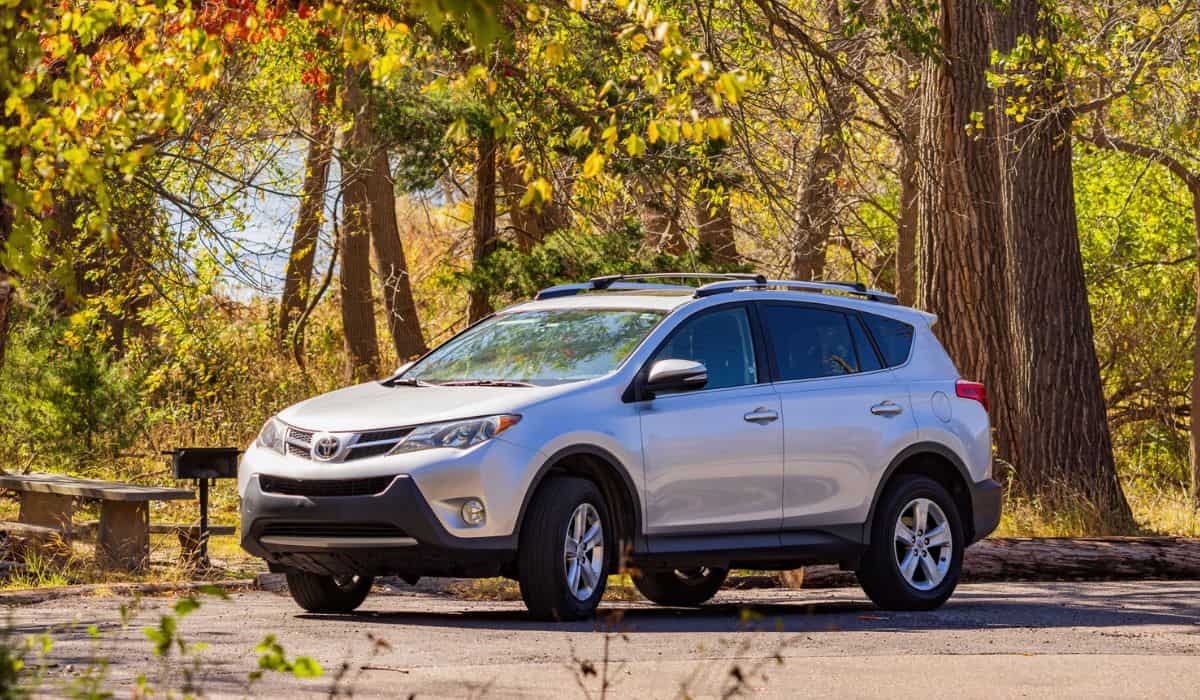How Reliable Is A Toyota RAV4 Hybrid? (And Which Years To Avoid)
The Toyota RAV4 Hybrid has emerged as a star player in the expanding hybrid car market. Renowned for its fuel efficiency and comfort, the reliability of this particular model is often questioned. Are there specific production years of the Toyota RAV4 Hybrid that should be avoided?
Toyota RAV4 Hybrid cars have proven reliable and efficient over the years. The 2017 and 2021 models, in particular, are praised for impressive fuel economy and hybrid performance. However, the 2016 and 2019 models have received mixed reviews, so avoiding those years is better.
Toyota introduced its first RAV4 Hybrid (Recreational Active Vehicle with 4WD) in 2016. Since then, it has continued to build on the RAV4 Hybrid’s success with upgrades and innovations to create space in the hybrid car market. Let’s dig deeper and explore the life expectancy and common issues of owning a Toyota RAV4 Hybrid.

Related Reading: Toyota RAV4 (Non-Hybrid) Years to Avoid
What Is a Hybrid?
A hybrid car combines two or more sources of power in one vehicle. The most common combination is an internal combustion engine and an electric motor.
The engine is usually gasoline-powered, and a rechargeable battery powers the electric motor. The engine and motor work in tandem, and depending on the configuration, either one or both power sources can be used simultaneously.
Hybrids typically offer better fuel economy than conventional cars and are very popular in urban areas.
There are three standard configurations of hybrids:
- Parallel hybrids have both the internal combustion engine and the electric motor connected to the wheels through a common transmission. At any given time, the vehicle can run off the engine, the electric motor, or both.
- Series hybrids have only the electric motor connected to the wheels, and the internal combustion engine works to charge the batteries and power the electric motors. There’s no mechanical connection between the engine and the wheels.
- Plug-in hybrids can be either series or parallel, but their special feature is a larger battery pack that can be charged with external power. This allows for a greater all-electric range and can help avoid using the internal combustion engine. The Toyota RAV4 is a plug-in hybrid.
What’s the Life Expectancy of a Toyota RAV4 Hybrid?
The RAV4 Hybrid is rated to last 200,000 to 300,000 miles with proper maintenance. Of course, this varies depending on the particular model and how well it’s been taken care of. You can expect the car to last for at least 15 or even 20 years if driven and serviced properly.
Since it’s a hybrid, the battery life expectancy is also very important. The 2020 or newer models of RAV4 hybrids are guaranteed for 150,000 miles/10 years, whichever comes first.
The older models, meanwhile, come with 100,000 miles/8 years warranty, many of which have exceeded this limit.
All these factors combined make the RAV4 Hybrid one of the most reliable hybrid cars on the market. However, the life expectancy of a car largely depends on how well it is taken care of by the owners; the more you take care of your car, the more mileage you’ll get out of it.
What Are the Most Common Issues With a Toyota RAV4 Hybrid?
The RAV4 Hybrid is a relatively reliable car. However, there are some major issues to look out for. Let’s have a look at the most common ones.
Stability Control and Brake Assist failures
The 2019 model of the RAV4 Hybrid has an issue with the stability control and brake assist due to a failing brake booster pump.
A small part inside the booster pump can break, cause an electrical failure in the system, and disable the driver’s ability to operate the vehicle safely.
Needless to say, these systems are critical from a safety standpoint, so Toyota issued a recall on several 2019 RAV4 Hybrids to fix the issue. The 2016 and 2017 model years also saw a similar problem previously, but no recall was issued.
Unexplained Battery Drain
Every model year of the RAV4 Hybrid since 2017 has had some battery-drain issues. The 12V starter battery drains so much that it eventually requires a jump start.
Toyota has issued a Technical Service Bulletin to address the issue, and their solution is to update and reset the Data Control Module software. This should fix the issue; a new 12V starter battery is recommended if it persists.
Coolant Leak
For the 2019-2020 model years of the RAV4 Hybrid, a significant issue developed where cracks formed in the engine block, and coolant leaked through them. This caused stalling, overheating, slippage of the serpentine belt, and even white smoke from the engine bay.
This is one of the major reasons behind several recalls issued by Toyota on 2020 and 2021 models.
Failing Suspensions
This is another prevalent issue in the 2019 and 2020 model years. The problem is with the front arms of the suspension; they can get weak or even come loose due to a manufacturing defect. This can result in poor alignment, vibration, and loss of control over the vehicle, potentially leading to accidents.
Toyota is aware of this concern and has issued several recalls to replace the suspension, which solved the problem for good.
Fuel Tank Capacity Issues
The fuel tank on some RAV4 Hybrids from 2019 or 2020 can’t store the advertised 14.5 gallons of fuel and, instead, tops out at about 11 gallons. This results in a loss of up to 150 miles of range.
The problem stems from the shape of the fuel tank. Toyota changed the design in the later model years, but those with older RAV4 Hybrids have no choice but to live with the shorter range.
Roof Leaks and Windshield Cracks
A few of the RAV4 Hybrids from 2019 to 2021 have developed leaks in the roof due to the roof rail gaskets wearing out prematurely.
To fix that, Toyota produced replacement gaskets in 2021. Once installed, the roof leak should be gone for good.
Similarly, there have been reports of windshields cracking for no apparent reason. This is probably because Toyota manufactured different windshields for RAV4 Hybrid. Unfortunately, they ended up more fragile and prone to cracking.
Replacing the windshield is the only solution to fix the issue.
The Best Years for a Rav4 Hybrid

Toyota RAV4 Hybrid 2017 and 2021 stand out in terms of reliability and lack of issues. Both these models have received praise from reviewers and owners for increased performance and improved fuel economy.
2021 Toyota RAV4 Hybrid
The 2021 model is the most reliable for the RAV4 Hybrid. The issue of incomplete fuel tank filling, which started with the 2019 model, persists, but the overall quality, fuel economy, and performance have been significantly improved.
This model was also updated with sensors and extra safety features like blind-spot monitoring, lane departure warning, pedestrian recognition, adaptive cruise control, etc. All of these features also add to the price tag, of course.
2017 Toyota Rav4 Hybrid
If you don’t have pockets deep enough for the newer models, the 2017 Toyota RAV4 Hybrid is the best option. It’s essentially the same overall package as the 2016 RAV4 but has fewer problems.
According to CarComplaints, the 2017 model year sees only three major issues, which can be compared to 17 major problems with the 2016 model. It’s also updated with an improved transmission, better steering, and a more efficient powertrain.
Avoid These Years
Now let’s talk about the RAV4 Hybrid models that you should absolutely avoid.
2016 Toyota RAV4 Hybrid
In contrast to the non-hybrid 2016 RAV4 that received rave reviews, the hybrid version could have fared better. It was the first hybrid RAV4 and came riddled with a long list of major issues related to the vehicle’s exterior and interior. These include:
- Body paint peeling off
- Brake system failures
- Poor performance of interior accessories and lighting
- Inefficient fuel system
2019 Toyota RAV4 Hybrid
This model year has had a tough time. In fact, Toyota issued more recalls and service bulletins for this model than any other year. Most issues are related to suspension failures, engine coolant, and fuel tank capacity. Other possible issues include:
- Faulty airbag sensor
- GPS sensor errors
- Inaccurate lane departure cameras and blind spot detection
- Problems with collision avoidance
Share Your Insights With US
Did we forget something, get something right (or wrong)? We’d love to hear your insights! Share your automotive experiences based on our article in the comments below. Your input enriches our community’s knowledge. Thanks in advance for sharing!
Original RAV4 vs. RAV4 Hybrid: Which Is More Reliable?
There’s no clear winner if you’re stuck between the RAV4 Hybrid and its conventional counterpart. Although the hybrid version may have a few more issues than the original, their reliability ratings are about even.
Two exceptions to this are the hybrid models released in 2016 and 2019, which are far less reliable than their non-hybrid counterparts due to the reasons we’ve already discussed.
Overall, hybrid technology is gradually improving with each model year as Toyota continues to make improvements. And both the hybrid and original RAV4s are reliable models that should last you for years to come.
Discover valuable insights and expert advice on Toyota RAV4 Years to Avoid in our comprehensive RAV4 category page. Explore our articles on Best Years for Toyota RAV4, Most Reliable SUV After 5 Years, RAV4 Hybrid Towing Capacity, and Toyota RAV4 Hybrid Reliability.

There are no comments on the 2018 rav 4 hybrid limited. I am about to buy. Why no mention? Any issues w/this year?